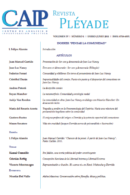
Published 2021-07-13
Keywords
- as if,
- transcendental idea,
- will to illusion,
- autoimmune
How to Cite

This work is licensed under a Creative Commons Attribution-NonCommercial 4.0 International License.
Abstract
This article analyzes the problem of representation in Kant and Nietzsche’s philosophy emphasizing the as if («als ob») notion and following Derrida’s reading of Kant and Vaihinger’s reading of Nietzsche. Based on The University without Condition by Derrida and the “democracy to come” discussion, the article highlights the way in which the as if challenges the classical distinction between constatative and performative judgements, and -in a more radical way- the distinction between nature and freedom. The article also explores Vaihinger’s argument that it is possi-ble to recognize an “as if metaphysics” in Nietzsche’s philosophy. The as if appearclosely related to the idea of a “will to illusion”, as the illusion is itself the as if. The main problem that this article discusses refers to the possibilities opened by the as if for philosophy and for science in general. Among these possibilities there are risks that involve both the “life of spirit” and the human life itself. A possibility to face these risks may be found on Derrida’s notion of the “autoimmune”, given that the as if (the necessity of illusion) may be understood as a reason’s autoimmunity mechanism.